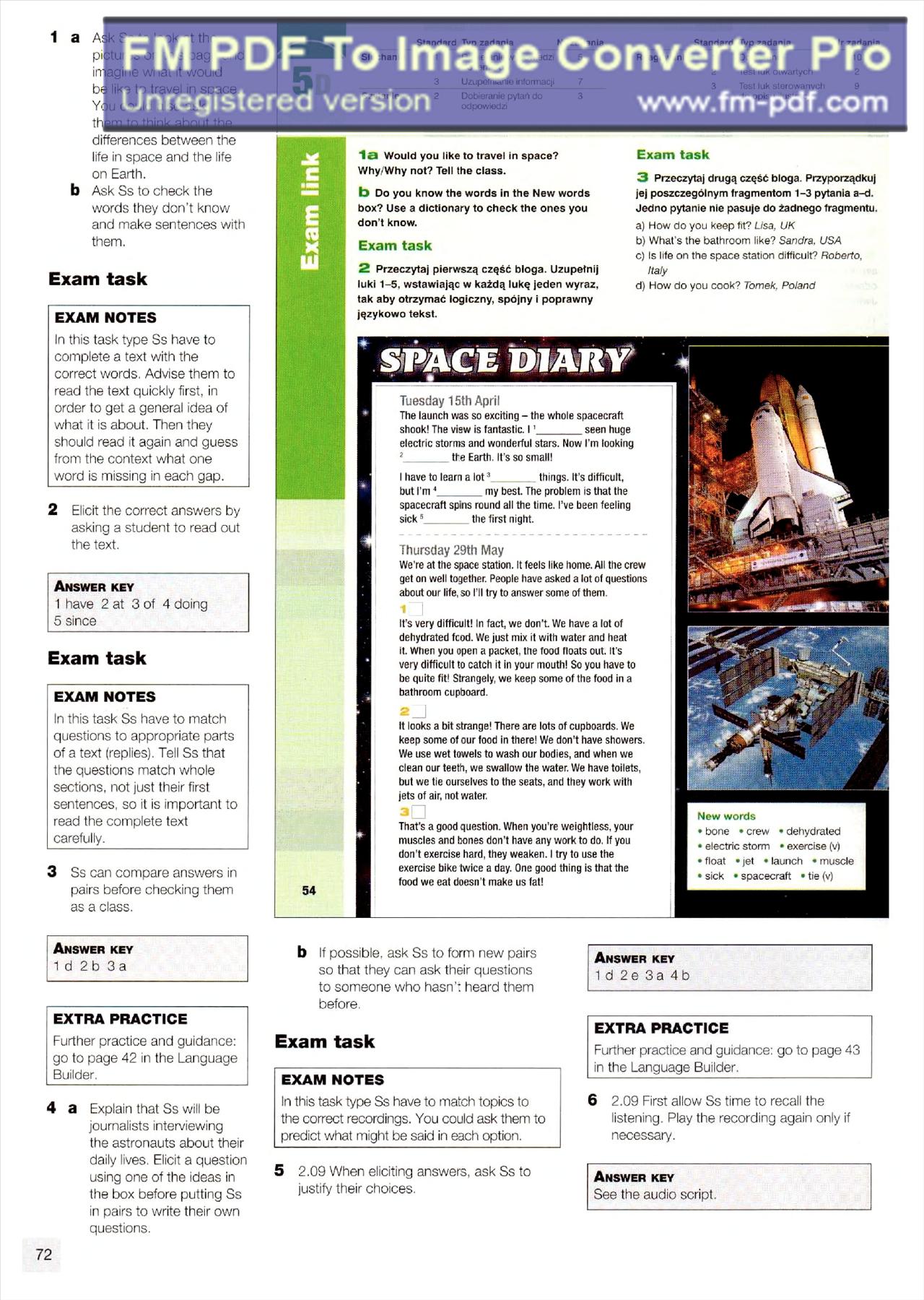Up¾at 3 Teacher's Book podrecznik nauczyciela plus odpowiedzi ,testy,klucz answer key Page 071

differences between the life in space and the lite on Earth.
b Ask Ss to check the words they don't know and make sentences with them.
Exam task
EXAM NOTES
In this task type Ss have to complete a text with the correct words. Advise them to read the text guickly first, in order to get a generał idea of what it is about. Then they should read it again and guess from the context what one word is missing in each gap.
2 Elicit the correct answers by asking a student to read out the text.
EXAM NOTES
In this task Ss have to match questions to appropriate parts of a text (replies). Tell Ss that the questions match whole sections, not just their first sentences, so it is important to read the complete text carefully.
3 Ss can compare answers in pairs before checking them as a class.

1a Would you like to travel in space? Why/Why not? Tell the class.
b Do you know the words in the New words box? Use a dlctionary to check the ones you don’t know.
Exam task
2 Przeczytaj pierwszą część błoga. Uzupełnij luki 1-5, wstawiając w każdą lukę jeden wyraz, tak aby otrzymać logiczny, spójny i poprawny językowo tekst.
Exam task
3 Przeczytaj drugą część błoga. Przyporządkuj jej poszczególnym fragmentom 1-3 pytania a-d. Jedno pytanie nie pasuje do żadnego fragmentu.
a) How do you keep fit? Usa, UK
b) What's the bathroom like? Sandra. USA
c) Is lite on the space station difficult^ Roberto. Italy
d) How do you cook? Tomek. Poland
Tuesday 15th April
The launch was so exciting - the whole spacecraft
shook! The visw is fantastic. I ’_seen huge
electric stornis and wonderful stars. Now Tm looking the Earth. Its so smali!
I have to learn a lot3 things. It's difficult,
but l’m \ my best. The problem is that the
spacecraft spins round all the time. I’ve been feeling sick5 the first night.
Thursday 29th May
We’re at the space station. It feels like home. All the crew get on well together. People have asked a lot of ąuestions about our life, so HI try to answer some of them.
It s very difficult! In fact, we don’t. We have a lot of dehydrated fcod. We just mix it with water and heat it. When you open a packet. the food floats out. It s very difficult to catch it in your mouth! So you have to be quite fit! Strangely, we keep some of the food in a bathroom cupboard.
It looks a bit strange! There are lots of cupboards. We keep some of our food in there! We don’t have showers. We use wet towels to wash our bodies, and when we clean our teeth, we swallow the water. We have toilets, but we tie ourselves to the seats. and they work with jets of air, not water.
That's a good ąuestion. When you're weightless. your muscles and bones don’t have any work to do. If you don't exercise hard, they weaken. I try to use the exercise bike twice a day. One good thing is that the food we eat doesnt make us fat!
New words
• bonę • crew • dehydrated
• electric storm • exercise (v)
• float • jet • launch • muscle
• sick • spacecraft • tie (v)
b If possible. ask Ss to fam new pairs so that they can ask their questions to someone who hasn’: heard them before.
Exam task
4 a Explain that Ss will be journalists interviewing the astronauts about their daily lives. Elicit a question using one of the ideas in the box before putting Ss in pairs to write their own questions.
EXAM NOTES
In this task type Ss have to match topics to the correct recordings. You could ask them to predict what might be said in each option.
EXTRA PRACTICE
Further practice and guidance: go to page 43 in the Language Builder.
6 2.09 First allow Ss time to recall the listening. Play the recording again only if necessary.
5 2.09 When eliciting answers, ask Ss to justify their choices.
72
Wyszukiwarka
Podobne podstrony:
Up?at 3 Teacher s Book podrecznik nauczyciela plus odpowiedzi ,testy,klucz answer key Page 020 gramm
Up?at 3 Teacher s Book podrecznik nauczyciela plus odpowiedzi ,testy,klucz answer key Page 031 Dialo
Up?at 3 Teacher s Book podrecznik nauczyciela plus odpowiedzi ,testy,klucz answer key Page 092 Gramm
Up?at 3 Teacher s Book podrecznik nauczyciela plus odpowiedzi ,testy,klucz answer key Page 100 ~7 Fi
Up?at 3 Teacher s Book podrecznik nauczyciela plus odpowiedzi ,testy,klucz answer key Page 135 2 &nb
Up?at 3 Teacher s Book podrecznik nauczyciela plus odpowiedzi ,testy,klucz answer key Page 136 Vc u
Up?at 3 Teacher s Book podrecznik nauczyciela plus odpowiedzi ,testy,klucz answer key Page 184 Stude
Up?at 3 Teacher s Book podrecznik nauczyciela plus odpowiedzi ,testy,klucz answer key Page 149 Unit
Up?at 3 Teacher s Book podrecznik nauczyciela plus odpowiedzi ,testy,klucz answer key Page 135 2 &nb
Up?at 3 Teacher s Book podrecznik nauczyciela plus odpowiedzi ,testy,klucz answer key Page 001 FM PD
Up?at 3 Teacher s Book podrecznik nauczyciela plus odpowiedzi ,testy,klucz answer key Page 005 Conte
Up?at 3 Teacher s Book podrecznik nauczyciela plus odpowiedzi ,testy,klucz answer key Page 006 Conte
Up?at 3 Teacher s Book podrecznik nauczyciela plus odpowiedzi ,testy,klucz answer key Page 009 FM PD
Up?at 3 Teacher s Book podrecznik nauczyciela plus odpowiedzi ,testy,klucz answer key Page 010 : Rea
więcej podobnych podstron